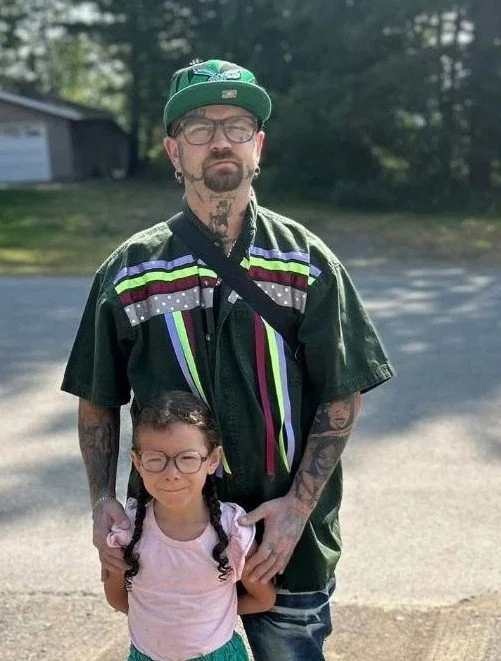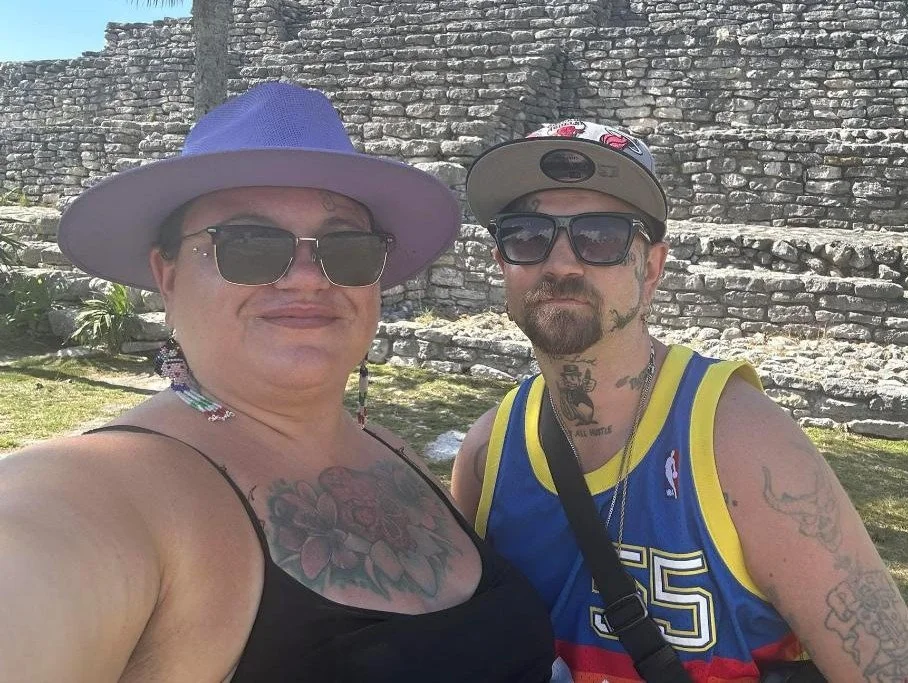Finding care far from home
Rick Meier with his granddaughter.
Rick Meier had lost almost 60 pounds and was sleeping long hours every day. Chores like mopping the kitchen floor would leave him dizzy and exhausted.
Rick, then 41, and his wife, Kim, were grieving the recent death of their daughter, Kaitlyn, from a drug overdose. At first, they thought Rick’s symptoms were due to grief and depression. But things got worse and he could barely get out of bed. Finally, Kim decided it was time to take him to emergency at their local hospital in Quesnel, a town of about 10,000 in northern British Columbia.
They were both shocked when a nurse asked, “How long have you had this heart murmur?” A year earlier, Rick’s heart had checked out fine in pre-operative tests before knee surgery. But now, an echocardiogram revealed that he had mitral valve prolapse with severe regurgitation.
The Meiers shared their story with Heart Valve Voice Canada.
After your mitral valve diagnosis, what happened?
Rick Meier: The doctor said, “You have a severely leaking heart valve, and there's nothing we can do for you here.” They discharged me and told us to wait to hear from a heart hospital in Kelowna or Vancouver, and they gave me an appointment for another echocardiogram in several months’ time.
What did you do?
Kim Meier: Rick was so sick; we were feeling too anxious to wait for a call. So, we made a pretty rash decision to drive to Kelowna, leaving our three kids and our granddaughter at home with a nanny. It was quite a scary drive. I kept pulling over to ensure that Rick was OK.
Rick Meier: The drive took about nine hours. I was lying in the back seat the whole time with an oximeter on my finger; my heart rate was super low. I was pretty much in and out of consciousness.
What happened when you got to the hospital in Kelowna?
Rick Meier: At emergency they did some tests, did some blood work, and discharged me. But I was not doing well; I was sweating and in and out of consciousness again. So we went back to emergency; this time I was admitted.
I got on the list for heart surgery to repair my valve. I ended up spending a total of seven weeks in the hospital.
Kim Meier: The medical team wanted us to go home to wait for a date for surgery in either Kelowna or Vancouver. But we weren’t willing to take the risk of being far from a cardiac centre if Rick took a turn for the worse.
It was already a scary situation. Plus, Rick had a heart monitor and it was going off a lot. We didn’t know what any of it meant and we weren’t really getting answers.
What was it like waiting for surgery?
Rick Meier: They kept saying that I was going to be on the list. But I think because I was relatively young, they kept moving me back. Finally, on a Friday, I was told, “You’re on the list for Monday.”
Going into the surgery, we did not know if my valve would be replaced or repaired. They were going to decide based on how damaged it was.
If I needed a replacement valve, it was going to be mechanical, not tissue. We had conversations with the surgeon about this before the operation, and we felt it was a good decision for me.
You finally had surgery. How did it go?
Kim Meier: Rick ended up getting his valve repaired, not replaced. I was expecting the operation to take 6½ hours. So I was kind of shocked to get a call after only 3½ hours, saying, “We had a successful repair.”
Another factor going into the surgery was that Rick has been taking Suboxone (an opioid blocker) long term. He had been previously addicted to opiates, but with the help of Suboxone, was clean and sober for the past eight years.
He was scared that pain medication after the operation might get him addicted again. So, after a lot of discussions with addiction doctors about the best course of action, they took him off Suboxone the morning of the operation. They were able to give him the fentanyl that he needed for pain, then transition him back to Suboxone after two days.
So Rick didn't get much pain management, and he hated taking the morphine that he controlled with a pump. He downplays it a lot, but it was miraculous that he was able to maintain his long-term sobriety. After heart surgery, most people are on pain medication for a lot longer than two days.
How did the initial recovery go?
Rick Meier: It was slow at first, but once I was able to get up and walk a little, I felt a significant improvement. I stayed in the hospital about two more weeks. Once I was able to walk a full lap around the ward, they discharged me.
Kim drove us all the way home. I just sat in the car hugging my new heart pillow.
We were given some information about what to do if I experienced problems, but there was no cardiac rehabilitation available in Quesnel.
And how are you doing today?
Rick Meier: After the first few months at home, I was doing well. My heart rate was around 90 beats per minute, and I felt that I truly had a new lease on life.
It means so much that I can be there for our granddaughter, especially, after she lost her mom. She’s just four and she is my best friend — she is Papa’s best friend for sure.
I am supposed to have a follow up appointment with the surgeon in Kelowna, but that did not happen.
Kim Meier: For me, follow up was the missing piece; we wanted to know that everything was functioning well with Rick’s heart.
So, we arranged for him to have an echocardiogram when we were in Mexico on vacation, more than a year after the surgery. A cardiologist conducted the test and told us Rick’s heart function looked great. We brought home the formal report and reviewed it with our internist here in Quesnel.
Rick has some other health issues that may be related to his heart, or to his recent diagnosis with Addison’s disease. So, we have been back to emergency a few times for those.
Kim and Rick on vacation in Mexico after his recovery from heart surgery.
What have you learned from this challenging experience with heart valve disease?
Kim Meier: I think it’s important not to minimize the signs in your body. Rick had a lot of signs that something was wrong with his heart. But because of his relatively young age, I don't think we ever thought it was his heart.
That's one thing that we took away from this; we don't ignore any signs now, because heart valve disease can happen to anyone, at any age.
Rick Meier: That's exactly what I'd say. Just listen to your body. I was sick for probably four or five months before we even thought to go to emergency and get looked at.
Kim Meier: The other part I would add is the importance of advocating for yourself.
With Rick's health needs now, if they can't meet them in our small rural community, then we seek out referrals. For example, the endocrinologist that Rick just saw was in Vancouver, and we did it all by Skype.


